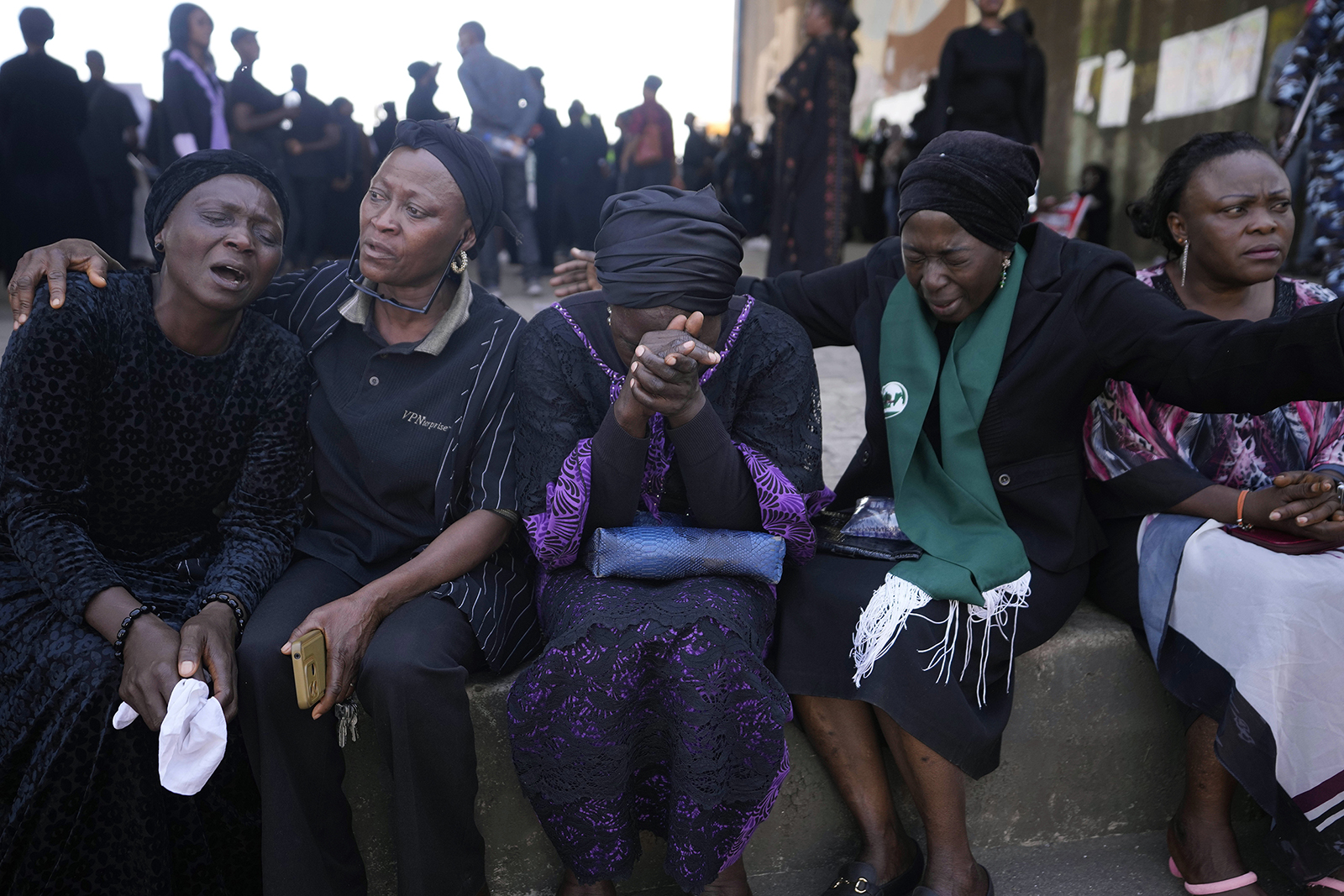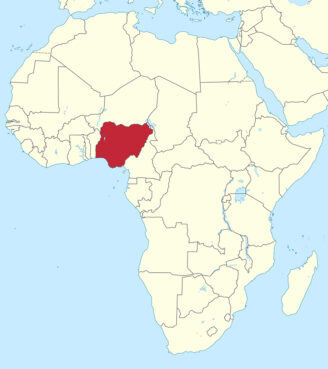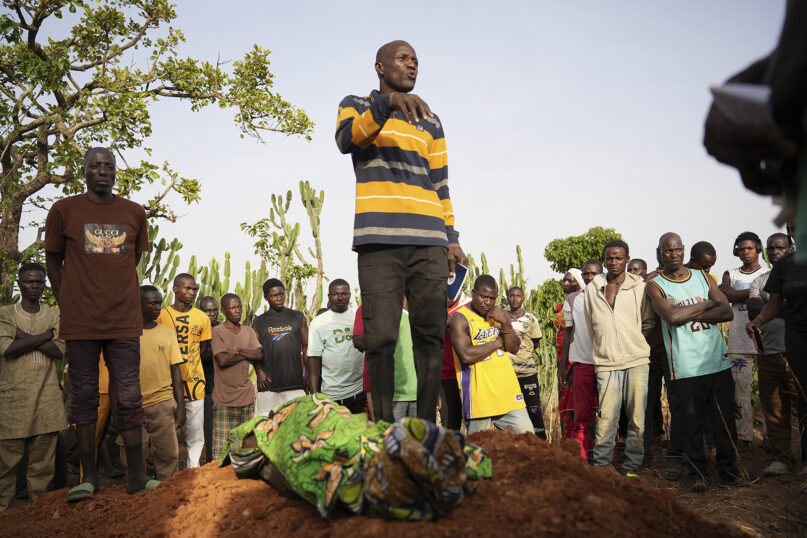
LAGOS, Nigeria (RNS) — Ruth Abah, 28, no longer walks to her local church, St. Paul’s, which now lies in ashes. Instead, the mother of two locks her doors and prays with her children, fearful the next attack could come at any moment.
On Aug. 11, suspected Fulani herdsmen stormed the compound of the Catholic church in the village of Aye-Twar, in central Nigeria, setting the church, rectory and parish offices ablaze along with vehicles and other property. Earlier raids had already forced the parish’s 26 outstations to shut down.
The latest assaults have sent the remaining residents fleeing into the bush, leaving the parish grounds and surrounding community eerily deserted.
The destruction of St. Paul’s is a stark sign of how attacks by Fulani “jihadists,” who champion Islam but are disavowed by many Muslims, is hollowing out once-thriving Christian communities across the region. Known as Nigeria’s “food basket,” Benue state has become a center of the violence that has left thousands dead this year.

Nigeria, red, located in Africa. (Map courtesy of Wikimedia/Creative Commons)
“I used to be in church every Sunday, singing in the choir,” Abah said in a phone interview. “Now I keep the doors locked. If I hear voices shouting at night, I pray silently. If they see me walking to church with a Bible, they could kill me.”
A new report by the International Society for Civil Liberties and Rule of Law, known as Intersociety, paints a grim picture. In the first seven months of 2025 alone, Islamist groups killed 7,087 Christians and abducted 7,800 others because of their faith. The country now sees an average of 30 Christians killed every day, making Nigeria the most dangerous place in the world to be a Christian.
Emeka Umeagbalasi, lead researcher and chair of Intersociety, described the situation as a “brutal massacre” of “defenseless Christians” and warned that unchecked killings and abductions are wiping out entire communities.
Nigeria, Africa’s most populous nation with more than 236 million people, has been plagued by Islamist violence for more than a decade, particularly in its northern and central regions. The insurgency began with Boko Haram, an extremist Islamist group that launched an armed campaign in 2009 to establish a caliphate and enforce a strict interpretation of Shariah.
The group gained international notoriety in 2014 after abducting 276 schoolgirls from Chibok, sparking the global #BringBackOurGirls campaign. Though weakened by military offensives, Boko Haram splintered, and its more brutal faction, the Islamic State West Africa Province, continues to carry out mass killings, kidnappings and church burnings.
Christians, who make up about half of Nigeria’s population, have borne the brunt of the violence, especially in the region called the Middle Belt, where Muslim herders and largely Christian farming communities clash over land and resources. Armed Fulani militias — some linked to jihadist groups — increasingly target villages, pastors and churches, displacing communities and leaving farmlands abandoned.
“The attacks are strategic,” said Peter Akachukwu, a security analyst in Lagos. “Targeting Christians sows fear, displaces communities and opens up land for occupation. It destabilizes the state and undermines faith in government protection.”

People attend the funeral of a man who was killed during an attack by gunmen in the Zike farming community in north-central Nigeria, April 15, 2025. (AP Photo/Samson Omale)
Across Nigeria’s Middle Belt and northern states, congregations at Sunday services are shrinking. Families who once filled pews now pray quietly at home, afraid of becoming the next victims. Some travel long distances to find safer congregations; others have stopped attending altogether.
Pastor Emmanuel Ochefu, who leads a small Pentecostal church outside Makurdi in Benue state, said in a phone interview that attendance has dropped by more than half this year.
“People call me during the week asking if the service will be safe, if the roads are clear,” he said. “Some decide to stay home rather than risk being kidnapped or attacked. I preach hope, I preach courage, but fear is stronger than my words right now.”
To keep worship alive, Ochefu has shortened services, started holding them earlier in the day and shifted some meetings to private homes. He sends recorded sermons and Bible verses by phone to members too scared to attend. “But church is meant to be together,” he said. “You can’t hug someone through a phone.”
Church leaders say the Aug. 11 assault was not just an attack on property but an assault on faith itself.
In a statement, the Nigeria Catholic Diocesan Priests’ Association condemned the attack as “barbaric” and “an attack on the Church,” saying it led to the “desecration and destruction of the Parish Church, the Parish Secretariat, the Father’s House and many other valuable items.”
They urged the government to rebuild the parish and its outstations and to deploy security forces to protect vulnerable communities, warning that continued inaction could lead to more deaths and displacements, further weakening Christian presence in the region.
The violence is reshaping what it means to be Christian in Nigeria. Believers now hide crosses, avoid public prayer and strip Christian symbols from their cars and homes.
“If I stopped being Christian, maybe my life would be easier,” Abah said. “But I cannot. My mother taught me this faith, and my children sleep under crosses. Faith is everything, but faith is heavy now.”
The Nigerian government insists the violence is driven by ethnic and land-use conflicts rather than religion alone, but human rights groups argue Christians are targeted specifically for their faith and are urging stronger protections, faster response times and accountability for perpetrators.
For now, pastors like Ochefu keep showing up, even if only a handful gather. “Even if just 10 people come next Sunday, I will preach,” he said. “The church is not just a building. As long as one believer remains, there is hope.”
